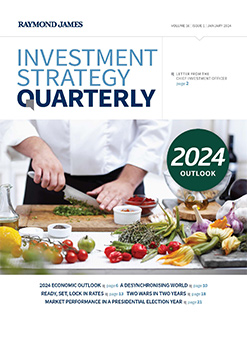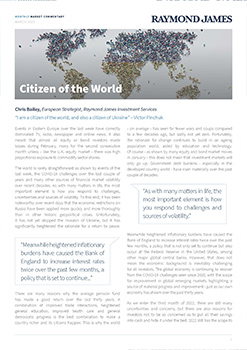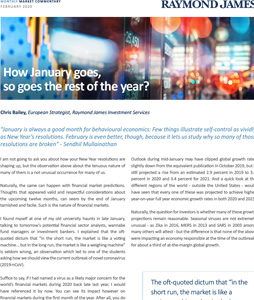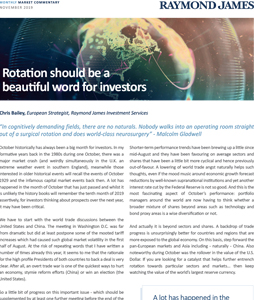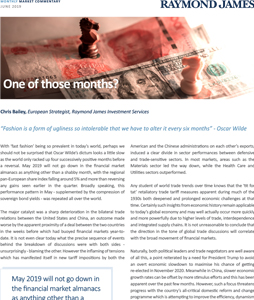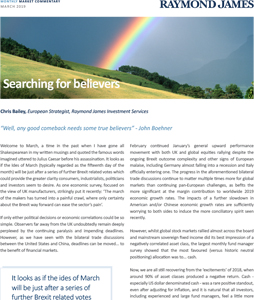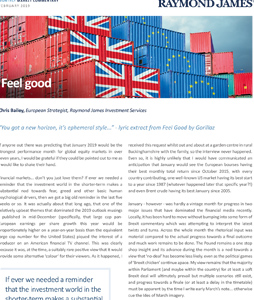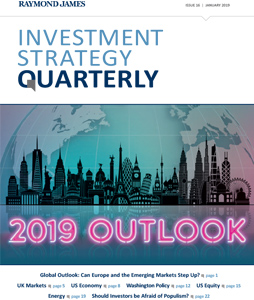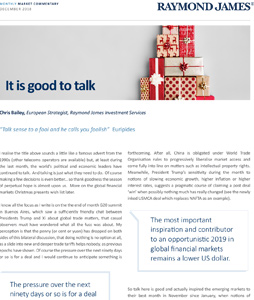The first Investment Strategy Quarterly of the year discusses 10 themes for 2024, plus a look at bonds, energy security, and market performance in a presidential election year. Read all this and more in Investment Strategy Quarterly: 2024 Outlook.
Autumn Statement Analysis 2023
Citizen of the World
Events in Eastern Europe over the last week have correctly dominated TV, radio, newspaper and online news. It also meant that almost all equity or bond investors made losses during February, many for the second consecutive month unless – like the U.K. equity market – there was high proportional exposure to commodity sector shares.
How January goes, so goes the rest of the year?
I am not going to ask you about how your New Year resolutions are shaping up, but the observation above about the tenuous nature of many of them is a not unusual occurrence for many of us. Naturally, the same can happen with financial market predictions. Thoughts that appeared valid and respectful considerations about the upcoming twelve months, can seem by the end of January tarnished and facile. Such is the nature of financial markets.
Rotation should be a beautiful word for investors
October historically has always been a big month for investors. In my formative years back in the 1980s during one October, there was a major market crash (and weirdly simultaneously in the U.K. an extreme weather event in southern England), meanwhile those interested in older historical events will recall the events of October 1929 and the infamous capital market events back then. A lot has happened in the month of October that has just passed and whilst it is unlikely the history books will remember the tenth month of 2019 assertively, for investors thinking about prospects over the next year, it may have been critical.
One of those months?
With ‘fast fashion’ being so prevalent in today’s world, perhaps we should not be surprised that Oscar Wilde’s dictum looks a little slow as the world only racked up four successively positive months before a reversal. May 2019 will not go down in the financial market almanacs as anything other than a shabby month, with the regional pan-European share index falling around 5% and more than reversing any gains seen earlier in the quarter. Broadly speaking, this performance pattern in May – supplemented by the compression of sovereign bond yields – was repeated all over the world.
Searching for believers
Welcome to March, a time in the past when I have gone all Shakespearean in my written musings and quoted the famous words imagined uttered to Julius Caesar before his assassination. It looks as if the Ides of March (typically regarded as the fifteenth day of the month) will be just after a series of further Brexit related votes which could provide the greater clarity consumers, industrialists, politicians and investors seem to desire. As one economic survey, focused on the view of UK manufacturers, strikingly put it recently: ‘The march of the makers has turned into a painful crawl, where only certainty about the Brexit way forward can ease the sector’s pain’.
Feel good
2019 Outlook
If you had to sum up why world, ex-US, financial markets typically underperformed during 2018 then economic growth, currency movements, and trade talk uncertainties would be the three most influential headwinds. Simply put, U.S. economic growth surprised on the upside whilst other major economies did not, the dollar appreciated against most other currencies, and concerns about essential future trading relations impacted the more export-focused European and emerging markets last year. In order for international markets to gain momentum over the U.S. in 2019, these concerns need to be quelled.
It is good to talk
I realise the title above sounds a little like a famous advert from the 1990s (other telecoms operators are available) but, at least during the last month, the world’s political and economic leaders have continued to talk. And talking is just what they need to do. Of course making a few decisions is even better… so thank goodness the season of perpetual hope is almost upon us. More on the global financial markets Christmas presents wish list later.

